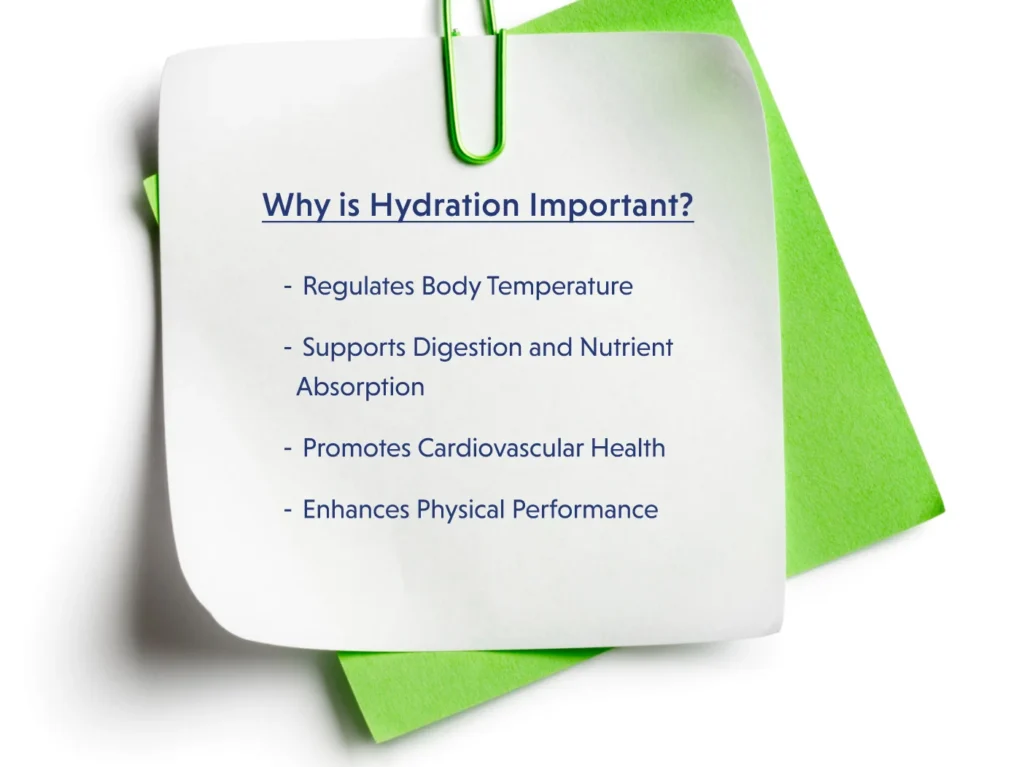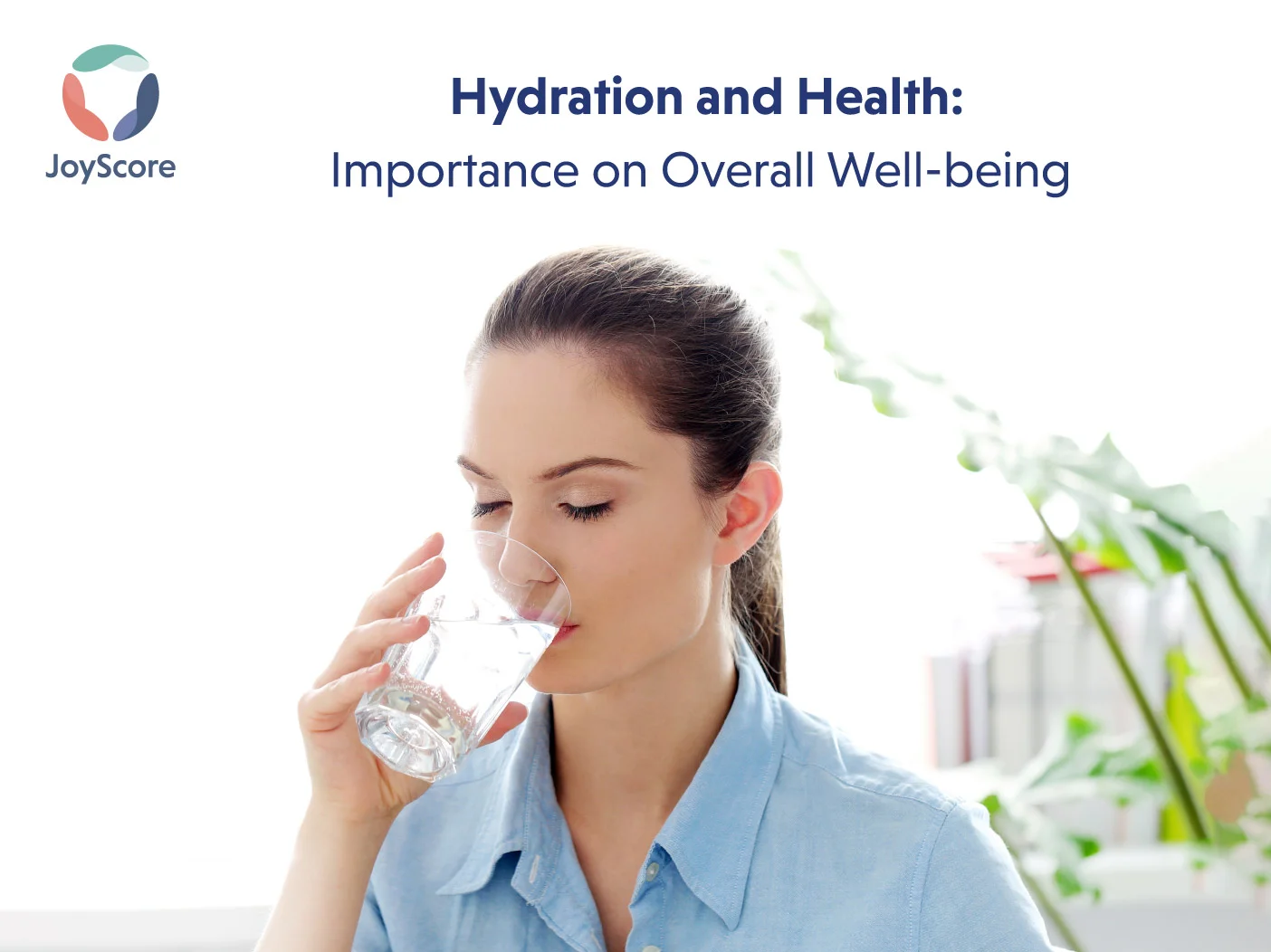Water is the elixir of life, and maintaining adequate hydration levels is crucial for our overall well-being. Water plays a critical role in (try not to use the same words back to back, writer said “maintaining” in the above sentence.) our bodies, including regulating body temperature and supporting vital functions. (don’t make accusations at people (aka the reader) when you don’t know them or their habits ) We should all pay more attention to the importance of staying well-hydrated and recognize its impact on our health. Download Joyscore to explore the significance of drinking enough water and its profound effects on our physical and mental well-being.
Why is Hydration Important?

Water is a fundamental component of our bodies, constituting about 60% of our body weight. Every cell and organ relies on water to function correctly. Here are some key reasons why hydration is vital for our health:
1. Regulates Body Temperature:
Maintaining a stable body temperature is important for better health. Water helps dissipate heat from the body through perspiration, keeping us cool and preventing overheating. When we are dehydrated, our body’s ability to regulate temperature is compromised, leading to an increased risk of heat-related illnesses such as heatstroke.
2. Supports Digestion and Nutrient Absorption:
Adequate hydration is essential for proper digestion. Water assists in the breakdown of food and facilitates the absorption of nutrients within the digestive system. It also prevents constipation by softening the stool and facilitating bowel movements. Insufficient water intake can lead to digestive issues like indigestion and constipation.
3. Promotes Cardiovascular Health:
Maintaining proper hydration is advantageous for our cardiovascular system. Satisfactory water consumption helps ensure an optimal blood volume, enabling the heart to pump blood efficiently. Additionally, it aids in preventing the formation of blood clots, consequently lowering the chances of developing cardiovascular diseases like heart attacks and strokes.
4. Enhances Physical Performance:
For individuals involved in physical activities or sports, proper hydration is vital for optimal performance. When we exercise, we lose water through sweat, and if not replenished adequately, it can lead to dehydration. Dehydration can cause fatigue, reduced endurance, and impaired cognitive function, hampering overall performance.
The Importance of Drinking Enough Water:

Now that we understand the significance of hydration, let’s delve into the importance of drinking enough water to maintain optimal hydration levels. The human body constantly loses water through various processes, such as sweating, breathing, and urination. In order to make up for these losses, it is crucial to replenish the body’s water reservoir by consuming a sufficient amount of water throughout the day.
1. Prevents dehydration:
Dehydration transpires when the body experiences a greater loss of water compared to its intake. Mild dehydration can cause symptoms like dry mouth, fatigue, and headache. Severe dehydration can lead to dizziness, rapid heartbeat, low blood pressure, and even organ failure. By drinking enough water, we can prevent dehydration and maintain proper bodily functions.
2. Supports Cognitive Function:
Research suggests that even mild dehydration can impair cognitive function and mood. Research has indicated that dehydration can result in diminished attention, reduced concentration, and impaired memory performance. By staying well-hydrated, we can support our brain health and ensure optimal cognitive function.
3. Promotes Skin Health:
Proper hydration is important for healthy, glowing skin. Water helps maintain skin elasticity, flushes out toxins, and keeps the skin hydrated from within. Insufficient water intake can result in dry, dull skin, exacerbating skin conditions like eczema and acne. By drinking enough water, we can promote a clear and youthful complexion.
4. Aids Weight Management:
Drinking enough water can aid in weight management efforts. Water has no calories, and consuming it before meals can help reduce calorie intake by creating a feeling of fullness. Additionally, water plays a crucial role in metabolism and fat breakdown. Staying well-hydrated can support weight loss goals and overall healthy body composition.
How much water should I drink?
The ideal amount of water to drink varies significantly from person to person due to individual factors such as metabolism, temperature, diet, age, and any existing medical conditions. It is particularly crucial for children and older individuals to ensure they consume an adequate amount of water.
Generally, men require around 2.5 liters daily, while women need approximately 2 liters (increase by an additional cup if pregnant or breastfeeding). Babies should consume 0.7 to 0.8 liters per day from breast milk, so they require between 4 cups and 6 to 8 cups for teenagers daily.
Approximately one-fifth of our water intake comes from food, while the remainder is obtained through drinking fluids. Fluid intake can be fulfilled through various sources, other than water, including tea, coffee, fruit juice, and soft drinks. However, it is essential to be cautious about the quantity consumed, as excessive intake can contribute to weight gain, dental issues, and unwanted stimulant effects.
Tips for Staying Well-Hydrated:
To ensure optimal hydration, here are some practical tips to help you drink enough water throughout the day:
1. Carry a Water Bottle: Keep a reusable water bottle with you wherever you go. This will be a constant reminder to drink water and make it easily accessible.
2. Set Reminders: Set alarms as reminders to drink water at regular intervals. This can be especially helpful if you have a busy schedule.
3. Infuse Water with Flavors: If you find plain water boring, infuse it with flavors by adding slices of fruits like lemon, cucumber, or berries. This can encourage you to increase your water intake and will make it enjoyable.
4. Monitor Your Urine Color: Pay attention to the color of your urine. A pale, straw-colored urine indicates adequate hydration, while a darker yellow color suggests dehydration. Use this as a guide to adjust your water intake accordingly.
Conclusion:
Drinking enough water is not just a matter of quenching our thirst; it is a crucial step toward maintaining overall well-being. Hydration impacts various aspects of our health, including body temperature regulation, digestion, cardiovascular health, and cognitive function. By prioritizing hydration and incorporating simple habits like carrying a water bottle and setting reminders, we can ensure that our bodies receive the hydration they need for optimal function. So, let’s raise a glass for our health and make drinking enough water a daily priority. Cheers to staying well-hydrated and thriving!



